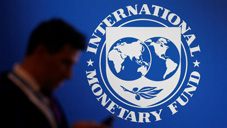IMF forecasts 4.6% economic growth in Georgia in 2019
By Tea Mariamidze
Friday, March 1


The IMF team was led by Mercedes Vera-Martin and they visited Tbilisi during February 20-26, 2019 to discuss recent economic and financial developments and progress with structural reforms.
The statement of the team reads that the Georgian banking sector remains well capitalized, liquid, and profitable.
“Growth is projected at 4.6 percent in 2019. Significant infrastructure investment is expected to compensate for weaker external demand and slower credit growth. Scaling up infrastructure expenditure will need to be accompanied by improved project selection and management,” the IMF said, adding that current account deficit is projected at around 8 percent of GDP, owing to still-robust growth in exports and remittances.
The team commended the authorities for advancing structural reforms and stressed the need for continued efforts to promote inclusive growth and higher economic resilience to external shocks.
“The authorities introduced measures to limit household indebtedness and revised the fiscal rule. They are also progressing toward a new insolvency law, a more automated VAT refund system, and a strengthened banking resolution framework,” the statement reads.
The IMF also noted that the current economic environment offers an opportunity to improve education and the business environment while strengthening Georgia’s connectivity and trade integration.
“These reforms will support private-sector led growth, diversify the economy, and create jobs, thereby improving the living standards of Georgian citizens,” the statement reads.
The team also said the downside risks to the outlook calls for continued exchange rate flexibility, reserve buildup, and prudent macroeconomic policies.
They also added that the steadfast implementation of the authorities’ reform agenda is needed to increase economic resilience and make growth more inclusive.
